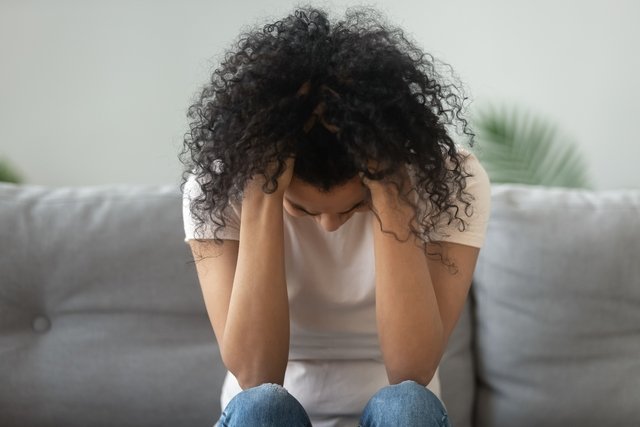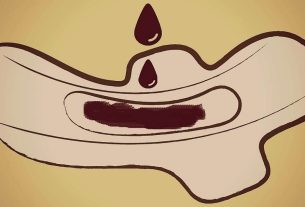Anxiety is a temporary and normal reaction of the body to situations that cause worry or fear, such as needing to give a public presentation, have a job interview or take an exam at school.
However, when anxiety is intense, appears for no apparent reason and interferes with daily tasks, it may indicate an anxiety disorder such as generalized anxiety disorder, panic disorder or phobia.
In case of anxiety, especially if symptoms are frequent or intense, it is recommended to consult a psychiatrist for an evaluation. When indicated, anxiety treatment may involve psychotherapy and the use of medications such as anxiolytics and antidepressants.

Anxiety symptoms
The main symptoms of anxiety disorder are:
- Constant worry;
- Difficulty relaxing;
- Difficulty concentrating;
- Lack of attention;
- Sleep changes;
- Confused reasoning;
- Headache;
- Easy fatigue;
- Continuous feeling that something bad could happen.
Along with these manifestations, anxiety can also be accompanied by physical signs such as increased heart rate, rapid breathing and excessive sweating, for example. Check out more symptoms of anxiety.
online anxiety test
If you think you suffer from an anxiety disorder, select what you have been feeling in the last two weeks:
The symptom test is only a guidance tool and does not serve as a diagnosis or replace consultation with a psychologist or psychiatrist.
What is an anxiety crisis?
An anxiety crisis is a situation in which anxiety symptoms, such as anguish, fear, worry or insecurity, are intense. Although symptoms sometimes appear quickly, it is common for the crisis to begin slowly as the stressful situation approaches.
The intensity of the anxiety attack can vary and, although it can be similar to a panic attack, they are not the same thing. Learn the main differences between anxiety and panic attacks.
Types of Anxiety Disorder
The main types of anxiety disorders include:
1. Generalized anxiety disorder
Generalized anxiety disorder occurs when anxiety stops being temporary and becomes very frequent, causing the person to experience worry and fear even in moments that would not be considered stressful. Know the symptoms of generalized anxiety disorder.
This type of disorder tends to worsen over time, especially when no treatment is provided, and therefore, people with this anxiety disorder are at greater risk of developing depression, as well as other psychological disorders.
2. Panic disorder
It is an anxiety disorder in which intense symptoms of anxiety appear suddenly, are recurrent and usually have no apparent cause. See more symptoms of panic disorder.
3. Separation anxiety disorder
Separation anxiety disorder is more common in children and is characterized by excessive distress or worry about being separated from specific people, such as parents, other family members and caregivers, or just because this possibility exists.
4. Selective mutism
It is a type of anxiety disorder that is more common in childhood and causes the person to be unable to speak to anyone other than immediate relatives, such as parents or siblings. Understand better what selective mutism is.
5. Social phobia
Social phobia is an anxiety disorder in which there is excessive fear or worry due to the possibility of being evaluated by other people, such as when going out with friends and giving a presentation at school or work. Find out more symptoms of social phobia.
6. Agoraphobia
Agoraphobia occurs when there is a fear of being in open spaces, public spaces or leaving the house alone, for example. Check out what agoraphobia is.
7. Post-traumatic stress disorder
Post-traumatic stress disorder can appear in people after experiencing traumatic situations, such as car accidents or kidnappings, and can cause symptoms such as excessive and constant fear. See more symptoms of post-traumatic stress.
Possible causes of anxiety
The specific cause of anxiety disorder is not known. However, this disorder appears to be more frequent in cases of:
- History of anxiety disorder in the family;
- Frequent exposure to situations that cause a lot of stress or negative feelings;
- Illnesses such as thyroid disorders, heart problems or chronic pain;
- Having experienced a traumatic situation at some point in life, such as physical or verbal violence.
People who are trying to stop using substances, such as alcohol or drugs, are also at greater risk of developing an anxiety disorder resulting from withdrawal caused by addiction.
How to confirm the diagnosis
The diagnosis of an anxiety disorder is made by a psychiatrist taking into account characteristics of the symptoms, such as intensity and frequency, situations that cause its emergence and the impact of anxiety on daily tasks.
Taking care of your health has never been easier!
In addition, the doctor may also recommend evaluation and monitoring by a psychologist to help confirm the diagnosis.
Treatment Options for Anxiety
Treatment for anxiety should always be guided by a psychologist and/or a psychiatrist, and may involve:
1. Psychotherapy
Psychotherapy consists of sessions in a psychologist’s or psychiatrist’s office, which aim to help identify the reason for anxiety and develop tools and/or skills that help deal with excessive stress. Understand better what psychotherapy is and how it is done.
In milder cases, psychotherapy may be enough to alleviate the anxiety disorder, without the need for medication.
2. Medicines
At the beginning of treatment, the psychiatrist may recommend the use of antidepressants and, if necessary, complement the treatment with anxiety medications known as anxiolytics, which should be used according to the doctor’s instructions. Discover the main pharmacy remedies recommended for anxiety.
The most commonly used anxiolytics are benzodiazepines, such as lorazepam, bromazepam or diazepam, which act in the brain by regulating the production of some chemical substances that help relax and regulate the appearance of symptoms. However, these medications can cause several side effects and should therefore only be used under the guidance of a doctor.
Natural treatment for anxiety
Natural treatment is a great way to complement the treatment recommended by your doctor, as it includes the use of techniques that help promote relaxation and control stress and anxiety, however, they should not replace medical treatment. Ideally, natural treatments should be used under the supervision of the responsible doctor.
The main natural treatments recommended for anxiety are:
1. Healthy lifestyle
Having a healthy lifestyle not only helps maintain physical health, it is also an excellent way to maintain mental health and reduce anxiety. Healthy lifestyle behaviors include:
- Exercise regularly, at least 3 to 5 times a week;
- Have a healthy and balanced diet;
- Avoid the consumption of alcohol or caffeine;
- Stop smoking;
- Sleep at least 8 hours a night.
These behaviors should be maintained by people with anxiety as they help to control symptoms more effectively and for longer.
2. Meditation
Meditation is a natural technique that aims to help people live in the present and reduce “noise” of worry that frequently appears in their thoughts. Several studies have shown that when applied to people with anxiety, meditation is capable of reducing stress and anxiety levels over time, as well as improving sleep and promoting self-knowledge.
3. Natural remedies
Natural remedies for anxiety can be recommended to complement the treatment advised by your doctor, and supplements and teas made from medicinal plants can be used, such as Kava-kava or Ashwagandha, which have anxiolytic properties. See more natural remedy options for anxiety.
However, it is important that the use of these remedies is always guided by a doctor, herbalist or other healthcare professional accustomed to the use of medicinal plants.

Sign up for our newsletter and stay up to date with exclusive news
that can transform your routine!
Warning: Undefined array key "title" in /home/storelat/public_html/wp-content/plugins/link-whisper-premium/templates/frontend/related-posts.php on line 12
Warning: Undefined array key "title_tag" in /home/storelat/public_html/wp-content/plugins/link-whisper-premium/templates/frontend/related-posts.php on line 13



